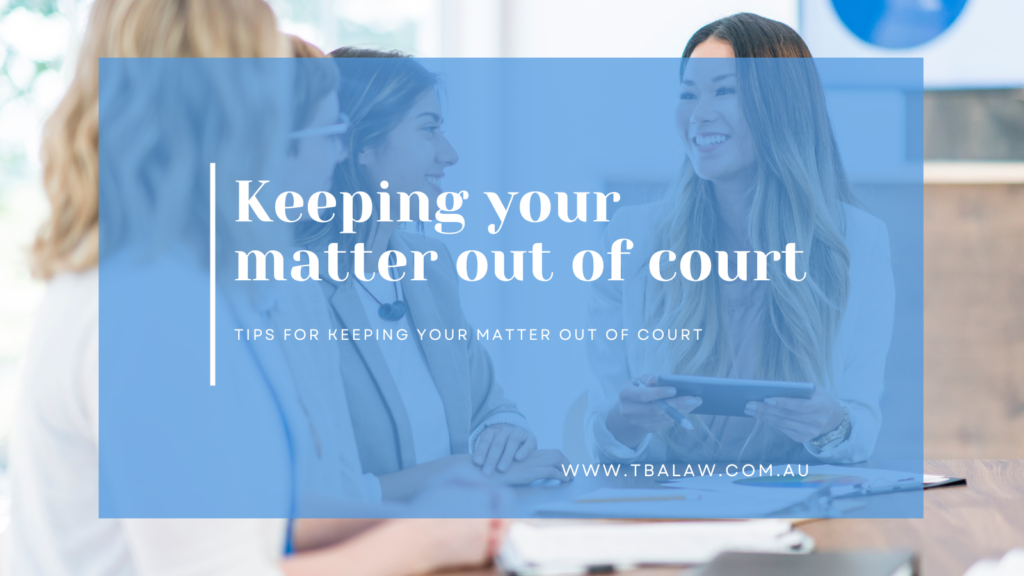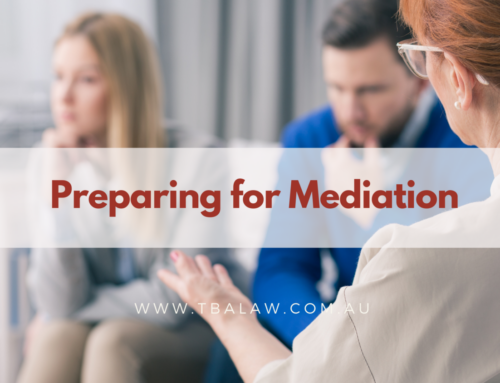Keeping Your Matter Out Of Court
Now, I know what you’re thinking: “Why would a lawyer want to keep my matter out of court?”
Well, contrary to popular belief, we actually don’t just want to get your matter into court and go hard. We have an obligation to the court and the system not to get your matter into court. There are obligations at the state level and at the federal level that as professionals we have to try alternatives to getting your matter into court.
The court systems are very blocked up, and so there’s a real push and encouragement in the industry to not end up in court. However, that being said, the way that lawyers are generally trained is not necessarily strong in conflict resolution, surprisingly enough. We tend to set people at odds with each other and increase issues rather than decrease issues. So try and find a lawyer who has some mediation training or has some collaborative training because they may approach your problem differently, and the way to keep it out of court is hopefully to try and get it into an alternative dispute resolution process as early as possible.

When lawyers take over the matter and try and negotiate, quite often the issues can increase and so can tensions, and so the first step is often trying to get the matter into some form of mediation. Early stage mediation is really successful and actually saves you a lot of time and money as well. So it is one of the main pathways or options that you should try. Now that we’re post-COVID, a lot of mediators went fully online, and so you can do mediation, a 90 minute online Zoom mediation. You don’t even have to be in the same room as the other person. So it’s generally 90 minutes, half day or full day mediations. Preferably, if you’re doing an early stage mediation, don’t have your lawyer there either.
It is also a good idea to get legal advice before you do dispute resolution. Find out what your options are, but then do the dispute resolution without a lawyer there because again, lawyers have this hard line advocate role quite often, and it’s hard for a lawyer to step out of that role, whereas mediation, the whole purpose is for you to narrow the issues down, not increase them, and for you to think about options that are actually going to suit you. So not being told what’s legally correct or what you should legally expect, but what actually suits you, and what you want, so you have far more control over the mediation process. Most matters resolve at mediation. The problem is that so many mediations actually happen at late stage. Mediations should happen earlier as soon as possible in order to save money and time on both sides.
Other ways of keeping a matter out of court is to look at your other alternatives. So other than alternative dispute resolution, there are also other services that could be engaged to help. So for example, an ombudsman, particularly for small business, the business commissioner in Victoria or other states, they also have a dispute resolution process. So engaging with another authority, so to speak, could resolve the matter there as well.
Sometimes, of course, you end up in court and some of the reasons for that are quite often just due to the amount of emotion involved. People aren’t ready to negotiate, or let go of some of their emotions or personalities that are involved. Sometimes it’s all about revenge—or other things driving what is needed—and sometimes that is because the other person won’t engage. So yes, sometimes you do have to commence court proceedings to get the leverage needed to actually make the other person engage with you. Once they are engaged, though, you can do an alternative dispute resolution process without the court actually being involved to help make a decision. So you can keep control over a long period of time—even once it is filed in a court.
So there you go—a couple of tips to try and keep your matter out of court. As I said, it’s really about keeping the matter within control of yourself and looking for alternatives other than court because there are plenty. You just need to know what they are, and find a lawyer who can advise you on what those alternatives are, and of course a referral to a mediator if that’s what you’re looking for.
Get in touch with our team if you need assistance, call 1300 043 103 or email admin@tbalaw.com.au.




Leave A Comment